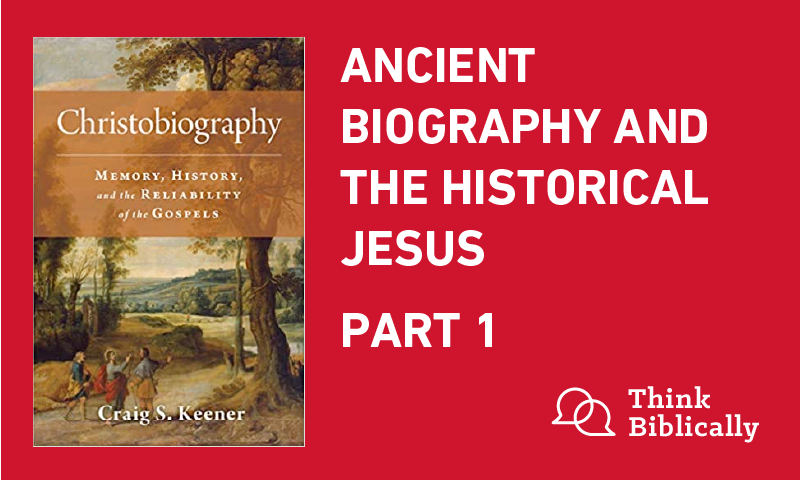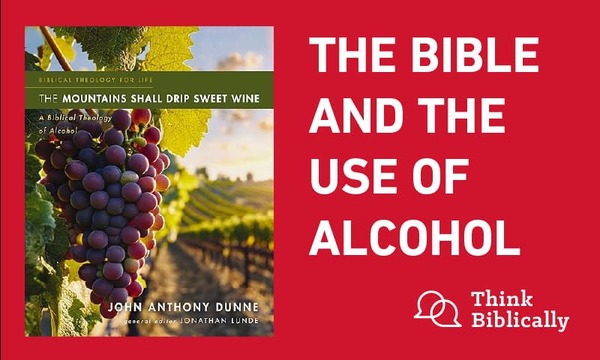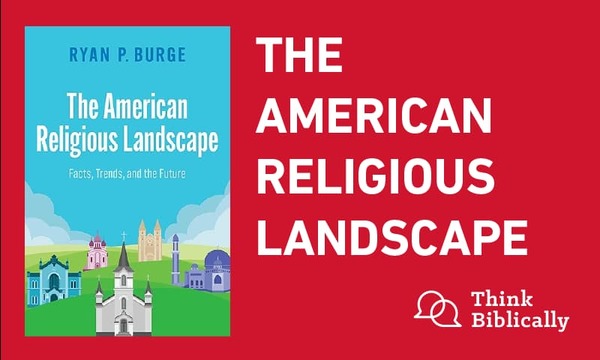How should we assess the accuracy of the gospel record of the life of Jesus, since the conventions of history writing were somewhat different in the ancient world compared to today. In his massive study, Christobiography, NT scholar Craig Keener compares the gospel record to the way ancient biography was written. Keener insists that the gospels should be regarded as historically accurate biographies, not historical novels, as some critics have maintained. Join us for the two part conversation on this critical topic as Scott interviews Dr. Keener.
More About Our Guest

Dr. Craig Keener is F. M. and Ada Thompson Professor of Biblical Studies at Asbury Theological Seminary in Wilmore, Kentucky. He is the author of 28 books, six of which have won Christianity Today awards, in addition to numerous journal articles.
Episode Transcript
Scott Rae: Welcome to the podcast Think Biblically, conversations on faith and culture. I'm your host, Scott Rae, Dean of faculty and professor of Christian ethics at Talbot School of Theology at Biola University. Here today with a special guest, Dr. Craig Keener, who is one of the most prolific New Testament scholars I know of. He holds a distinguished chair in biblical studies at Asbury Seminary in Wilmore, Kentucky and has just came out with a new book on the historical Jesus called Christobiography. Don't let the title scare you because it's a terrific book. It's very accessible. It is a pretty massive volume. But Craig, tell us in a sentence or two, what's the book about and how does it help us understand the historical Jesus?
Craig Keener: Sure. And it's great to be with you, Scott. The book is, well, just looking at the way biography was written in the ancient world, most people believe that the gospels are ancient biographies. Ancient biographies written in this period tend to be... This was the apex of historiographic interest in ancient biography. And it was especially true for those that were written within living memory of the subject about whom they were writing. So what we should expect is that the events that are reported in the gospels are events that the writers actually believed happened and since they were writing within living memory of the events, we should expect that just on a purely historiographic grounds, they had very good reason to believe that they were right.
Scott Rae: Okay. So tell me, what was the motivation for you to undertake this particular study? Because it's pretty detailed. It's about how ancient biography worked and historical reliability. So tell our audience a bit, why did you want to delve into this in the first place?
Craig Keener: I had written an earlier book on the historical Jesus of the gospels arguing that the gospels are our best sources for understanding about Jesus, which I think is a no brainer. Most people would agree with that in general. But I was taking for granted that people understood the nature of ancient biography because I had read most of the ancient biographies and I was foolishly assuming that most New Testament scholars had done the same.
Scott Rae: Not so much?
Craig Keener: Not so much. So I realized afterwards that really wasn't wise. New Testament scholars have plenty to read. They can't read everything. So I did a more in depth study testing how reliable ancient biographies in this period were, especially those written within living memory of the subject.
After I did that, I invited some of my doctoral students, I said, "Well, for this PhD seminar on historical Jesus, if any of you want to write on this, here's a subject where ground still needs to be broken." And so they explored other ancient biographies from this period. And by the time we were done, it was pretty obvious that these are history graphic works. Biographies by their nature, works about a recent historical person were meant to communicate actual information. Again, that sounds like a no-brainer, but not everybody agreed with that. And so this book is meant to show the fruits of that labor.
Scott Rae: Okay. So, I think, the average person I think tends to be a bit skeptical about the reliability of ancient history. The farther back we go, the less reliable it tends to be and the ancients didn't have a lot of the conventions that we have today for recording history. And I think some people have suggested that the gospels really fit the genre of what we would consider to be historical novels, better than factual biographies. How would you respond to that?
Craig Keener: Well, there's actually two questions there. The one is, and you may have to remind me of the second one after I finish with the first one, but I am an absent minded professor, but the nature of ancient historiography, most of our ideas of critical historiography actually go back to Polebeous and other ancient critical historians. They developed a lot of the methodology that we use today. Obviously they didn't have means to videotape or things like that, but they did try to be critical with their sources. They did prefer the sources closest to the events. They did prefer eye witnesses wherever they could get those. They understood that you have to test your sources. So we do have that.
Scott Rae: So the ancients actually invented some of the conventions for writing history that are still in use today.
Craig Keener: Yes, yes. Now that's not to say they always followed them consistently. Neither do historians today always follow them consistently when you check up on them. And they didn't have footnotes or they didn't have the way to access masses of information that we can electronically today and so forth, obviously. But the issue is not how long ago something is. There's something from Wesley's journal from 1742, December 15th and December 25th, 1742 that they often allude to, and people say, "Well that was hundreds of years ago." It was from his journal written on that very day. So it's just as much a firsthand account as something that was written yesterday in somebody's journal and it's more of a firsthand account than somebody remembering something that happened a year ago. So the question is not how long ago it was. The question is more, what's the distance in time between the events and the records of the events or the sources of those records on which we draw.
If we're talking about sources that depend on eye witnesses, then we have some good sources.
Scott Rae: And the time period is pretty short in the case of Jesus and the gospel writers.
Craig Keener: But by the standards of ancient historiography, almost whenever you date the gospels... There were a few people in the 19th century who wanted to date the gospels very late. David's Friedrich Strauss wanted to date them in the mid second century. There's virtually nobody today, almost nobody who would date any of the gospels that late and nobody who would date by any means all the gospels that late. The average critical dating for Mark is four decades after the ministry of Jesus.
Now today we depend most heavily, if we want to know about Alexander the Great, it's not our earliest biography of Alexander although it's one of our earliest, but it's considered the most reliable ancient biography about Alexander the Great, it's from about 400 years after Alexander the Great, but it depends on earlier sources. But we're talking about Mark is like one 10th of that time. So the span of time in terms of ancient biographies, we do have some that are from within like half a century. But not a whole lot.
So these are among the biographies that are closest to the biography among ancient sources.
Scott Rae: All right. So when the readers of the gospels in the first century, they were familiar, I take it with the genre of ancient biography.
Craig Keener: Yes.
Scott Rae: For the most part. What would they have expected in terms of historical accuracy in the gospel records?
Craig Keener: Yeah. And actually let me try to weave into that coming back to the second part of-
Scott Rae: Oh, that's right I forgot the second part.
Craig Keener: Well I think we're both professors, right? The idea of historical novels, most novels in antiquity were romances, which is a feature notoriously lacking in the gospels. But there were a handful of novels about historical characters, but none of them about recent historical characters. Most of them seem to be, you know how the DaVinci code talks about it subverts historical marker says this was researched and so on. Well, we don't for that reason, go around dismissing most things that claim to be history. We recognize this is subverting those markers.
The handful of historical novels are biographic novels in antiquity are that kind of thing. They're subverting the markers. But the standard genre that the mainstream of ancient biography was not like that. And if you trace biography from an early period to a late period, from what we might call prodo-biography, a few centuries before the gospels, to a form of hagiography in late antiquity, the period from 100 years before the gospels to 100, 150 years after the gospels was really the apex of when biographers were following the most historical protocols and hear I'm speaking of full length biographies, not the snippets where you've got a paragraph here and some things that are just a couple of paragraphs.
Oh, I'm sorry, I didn't answer your main question there.
Scott Rae: Yeah. What were the readers that expected in terms of historical accuracy?
Craig Keener: Well, they understood that biography was an information based genre. If you have members of a philosophic sept writing about the founder of their movement, they're going to give you information that they've received. They'll select what they're going to give you. They're going to shape it rhetorically to communicate it. But it's going to be based on information that they've received. Now, if that figure was a few hundred years before, some of that may be legend, but if that figure was within living memory, chances are you've got pretty accurate-
Scott Rae: Pretty accurate information. It's undeniable that the gospel writers had an agenda.
Craig Keener: Yeah.
Scott Rae: I've heard some people suggest that their agenda actually was actually more about proclamation than about simply recording history for history's sake. But they had an agenda, and it would seem to be especially true on the account of the miracles of Jesus. Why doesn't that agenda that they had compromise their historical reliability?
Craig Keener: Pretty much all ancient historians and biographers had agendas. Many of them will tell you upfront that we are recording these things for the sake of public morals. So you can learn from good examples and from bad examples. They often had a moral agenda. Sometimes there's a theological agenda. Josephus certainly had that when he's writing... He's a first century Jewish historian and he's defending sometimes the Jewish God against the charge of having abandoned his people and showing, "Well, look, we were the ones who messed up. And so the judgment came on us rightly. So don't disbelieve in our God because of that." The gospel writers are proclaiming, but that doesn't mean they're making up the information in the proclamation. And I believe they had good reason to believe what they did. If you've seen Jesus alive from the dead and he's commissioned you to go tell the world, chances are you're going to want to proclaim that too. But that doesn't mean you made it up.
Scott Rae: Yeah. In fact, I think you can actually make an argument that the importance of that proclamation actually suggests that they would be truthful.
Craig Keener: Yeah. The content of it is all about correct information.
Scott Rae: Well, it wouldn't have been out of reach for critics of Christianity in the early days to have been able to debunk information that the gospel writers had put out there had it been false. There were a lot of people with a lot of incentive to debunk the story as it was coming out. And I think the gospel writers too , every time they felt the pain of persecution, they had plenty of incentive to make sure that they had gotten the story correct. It seems to me those incentives work on both sides.
Craig Keener: That's true.
Scott Rae: So the fact that they had an agenda is not, is really, would you say neither here nor there when it comes to the gospels historical reliability?
Craig Keener: Yeah. We want to hear what the... There's the two levels. As Christians, we believe their agenda is inspired. We want to hear their message fully. Historians and I'm also a historian, as historians, we want to probe and see what's the information that we can get. So we may be asking for... Okay, so here's the information. Disciples say they saw Jesus alive from the dead, the proclamation that goes with it, he's therefore exalted Lord of the universe. Historian will say, "Okay, well as a historian I'm not going to talk about that part, but look, this is what the disciples say they saw and here's all this evidence that talks about their experience."
Scott Rae: Okay, so let's go back. New Testament scholars, gospel scholars, they're all over the map in terms of what they think actually really happened in the life of Jesus. But there are certain facts about the life of Jesus that you maintain that virtually every New Testament scholar except those that are really out there on the margins, would agree to that we're a part of the life of Jesus. What are those things that virtually every New Testament scholar agrees on were a part of the genuinely historical facts in the life of Jesus?
Craig Keener: Just for a sample of those, Jesus was from Nazareth. Virtually nobody disputes that except a handful of Jesus myther who deny that Jesus existed. But Jesus was from Nazareth. Jesus proclaimed the kingdom. He was baptized under John. He taught in parables and riddles and obscure sayings, sometimes proverbial like sayings, general aphorisms. Jesus was crucified under Pontius Pilot. Jesus was from Galilee and he was crucified close to Jerusalem. Most scholars would agree also that there was an element from the Jewish leaders in Jerusalem. Jesus was known as and experienced as a miracle worker. Now that's usually the case, usually agreed even by those who don't believe in miracles. They don't believe God did it. They believe that Jesus was somehow experienced that way.
Scott Rae: He was recognized that way by the people.
Craig Keener: Yeah, a healer and Exorcist, and that Jesus' disciples claimed to have an experience which they actually believed that they saw him alive from the dead. So, there's a lot there to work with.
Scott Rae: That's quite a lot. You can make a very vibrant gospel presentation out of what virtually every New Testament scholar agrees to, regardless of the critical lenses through which they view the gospel accounts. Now you maintain in your book that some of the material in the gospels is not in strict chronological order.
Craig Keener: Right.
Scott Rae: Can you give me us an example of maybe an episode that appears one way in one of the gospels and appears in a different order in another gospel?
Craig Keener: Yeah. An easy example of this would be Matthew has Peter's mother-in-law healed after the cleansing of the leper. Mark has the mother-in-law healed before the cleansing leper. So did Jesus have to heal Peter's mother-in-law twice? Did he have to cleanse the leper twice? Or in Mark, Jesus stills the storm, delivers the Decapolis demoniac after telling certain parables. In Matthew, he does it way after these, several chapters after recounting the parables and a number of other examples could be given. There was a writer in the reformation period by the name of Aussie Ander who, because he believed that the gospels had to be in strictly chronological order, he ended up to try to harmonize them, he had Gyrus' daughter raised from the dead three times. So obviously she must have still been sick each time he raised her yet.
Scott Rae: Calvin's kind of a problem.
Craig Keener: Yeah. Calvin and Luther said, "This is nonsense." They didn't feel compelled to put all this in chronological order. Ancient biographers, that wasn't part of the expectation. A lot of times they have anecdotes. People remember this incident, that incident. They don't necessarily remember in which order they happened. And so nobody really expected these biographies to be in chronological order unless they're saying this happened on such and such a date or something like that.
Scott Rae: One of the gospel say, Luke for example, claims to be in more chronological order. Is that true?
Craig Keener: Well, he says those who wrote before him weren't doing it in order, he's going to do it in order, but there's a question as to whether he means chronological order or rhetorical order. He does follow the sequence of Mark pretty closely with a few exceptions and where we can test him, he follows a sequence similar to Matthew, but Matthew even rearranges Mark topically and that's not uncommon. Suetonius who was a Roman biographer. His material is arranged topically and even Fila of Alexandria when he's talking about Moses, he's got a topical section and a chronological section and even some of his chronological section, he's moves things around for topical sake.
Scott Rae: Why did the gospel writers do this? Why do they arrange things differently than what will be accepted as the correct chronological order?
Craig Keener: Well, I'm not sure they always knew what the correct chronological order was in the sense that you've got these different anecdotes and you don't know necessarily in which sequence they go. Papias when he writes about Mark, and again this could refer to-
Scott Rae: The sole source for one of the sources for the gospel of Mark.
Craig Keener: Well Papias writes about one of the sources for the gospel of Mark. Papias is writing in the early second century. He's probably writing within living memory of Mark. Papias says that Mark got his material from Peter, he wrote it down, the things that Peter said, but not in a particular order. Obviously, the passion comes after that, the public ministry and so on.
Now is that chronological order or is that rhetorical order? That's a matter that scholars dispute. The way human memory works, we remember incidents, but we don't always remember when something happened. Putting them in chronological order can be somewhat difficult. So in the case of Matthew, it's like Matthew actually you can almost arrange with the hierarchical outline, which you can't do with Luke.
Scott Rae: Which means, what do you mean by that?
Craig Keener: Matthew, when you make say a sermon outline, point one, point two, point three and then sub-points. Matthew arranges his gospel that way. And so you've got more of a topical, not completely, but you've got more topical arrangements.
Scott Rae: So the materials arranged in order to make a point.
Craig Keener: Right.
Scott Rae: In order to have a certain structure to make a point.
Craig Keener: Yes.
Scott Rae: Now I can see where critics of the gospels might say the things being out of order just reflects sloppy history and is not something you would expect out of the inspired inherent word of God. How would you respond to that?
Craig Keener: I would say that they're judging the gospels by anachronistic standards, by standards that didn't exist in antiquity because that's not how biographies were written. Nobody expected biographies to be written that way.
And so people who do that, they would have to do that basically with ancient biography in general, ancient historiography in general. The expectation should be that the information is correct. Not that it is in a particular order. The gospels aren't claiming that it has to be all in this particular order.
Scott Rae: And I suspect that there are modern biographies that are not in strict chronological order either. They're done, as you suggest, for rhetorical reasons in order to make a bigger point. I could see where some biographies, I suspect are written just to record history, but most of them are written to make some sort of a moral or some sort of point about the life of the person who the biography is about. So the authors I think would have the same kind of rhetorical intent that ancient biographers had.
Craig Keener: Yeah. And especially on the level of popular biography. Now in terms of academic biography, the standards are a bit different. But even there, they're written from different perspectives so that you've got biographies of Lincoln with very different perspectives and in different periods. Since Lincoln, people have had different views of Lincoln as well, where it's been used for rhetorical purposes to address the times. Lincoln the liberator. Various different views of Lincoln.
Barry Schwartz is a memory theorist who's written on that. He's also written on the gospels and he really kind of debunks this. Some people actually cite him to say, "Well, memory isn't perfect. It gets reshaped." He says, "Yeah, but that doesn't mean the information isn't there." And he says that about the gospels. Yeah, they're making a point. But that doesn't mean that they're making up their information.
Scott Rae: Okay. And in fact, as we've already said, I think this is a really important point for our listeners. The fact that they're making a point, I think actually reinforces the need to be historically accurate rather than necessarily undermined.
Now, Craig, what about the spoken words of Jesus as recorded in the gospels. We've got different versions of those. Matthew has an account of a sermon on the mountain, for example. Luke has an account of what's called the sermon on the plain. There's a lot in common, but there's also a lot of difference between those two. Now they may have been given on two different occasions, but they also could just as plausibly I think be two different recounting of the same basic same set of teachings of Jesus. And a lot of teachings of Jesus are like that. There's a lot of variation among the gospels and so it sort of begs the question, did the gospel writers record the exact words of Jesus and would their readers have expected that or is that expecting too much out of a culture at the time that didn't have tape recorders that they could put somebody's face or a a camera, a television camera that would run and capture all this stuff? So which is it?
Craig Keener: There are cultures where people would insist that they were reciting entire epics verbatim and then once people came to record them and they come back a few years later and say do this again. And they do the performance again verbatim. But it wasn't the same words. But verbatim meant something different in that culture because they didn't have tape recorders. What they meant was, here's the substance, the gist was the same. And so the same people who point out, yeah there are differences in wording, point out that the gist is the same except for the people who try to distort that to say, Ah no, see the gospels and what they sometimes degrade is primitive backward cultures, very, very elitist standpoint. They ignore the part of it, the side of the research that says no, the gist is the same.
The gist is what had to be the same. And so yeah, the sermon on the mount, the sermon on the plain, you have some material in the sermon on the Mount that actually appears elsewhere in Luke or some of it elsewhere in Mark. And what that shows us is, yeah, this is material from Jesus, but again, things didn't have to be in chronological order. We actually have rhetorical handbooks in the day to talk about how to move these things around. So it doesn't have to be in sequence. As far as it being verbatim, nobody expected that. They understood better than most people today have understood except for those who have done these psychological tests in memory that just memory is a lot better than verbatim memory.
If you tell your kids the story of Goldilocks and the three bears, you don't have to use the same wording every time to tell the same story. A parable of Jesus could be recounted over and over again. It doesn't have to be given the same wording every time. So if it's somewhat different from one gospel to another, nobody was going to complain about that unless they were antagonistic towards Christianity and looking for holes that they could stick their hooks in.
Scott Rae: But it sounds like the audience for these critics would not have been particularly responsive to that criticism because they didn't expect.
Craig Keener: Nobody expected that.
Scott Rae: They didn't expect a verbatim recording of that.
Craig Keener: You look at what Josephus does with the Old Testament, the Greek translation of the Old Testament, and he follows the substance of it, but he freely paraphrases it and it was actually expected that you were supposed to paraphrase it. This is the sacred scriptures. He's paraphrasing. He's putting it in his own words. Our ancient rhetorical handbooks tell you you're supposed to do that. The gospels actually paraphrase less than was standard and conventional of time. They're closer to each other than was the expectations. So Matthew has kingdom of heaven. Mark has kingdom of God. That's not an error. That's just, you expect that. And people who don't recognize that, it's a very ethnocentric and anachronistic way of reading.
Scott Rae: Okay. So it sounds like we've got a lot that we can learn from the conventions of ancient biography. And it sounds like what you're suggesting here is that the more we dig into these conventions, the more trustworthy the gospels end up being historically. And the more careful we ought to be, not to hold the gospel writers to what you call, I think correctly anachronistic standards. We can't hold them to standards of accuracy that are in existence today that they didn't have access to at all in the first century.
Craig Keener: Yeah. Our standards keep changing. The way we do historiography changes over time. And so a hundred years from now, somebody may come along and say, "Well, the way they recorded things in the early 21st century is just not appropriate." Well, maybe not appropriate for then, but it's the way we would communicate today. People who are historically sensitive recognize that anachronistic approaches are inappropriate.
Scott Rae: Well, Craig, this is really helpful, I think for many of our listeners not only to answer some of the common criticisms that are made of the gospel, but to reinforce their own sense of the historical reliability of the accounts of the life of Jesus. So there's a lot more to talk about here. I want to let our listeners know we're going to do a part two of this, so I've got lots more questions for Dr. Keener on this terrific book called Christobiography, so be sure and join us next time as we continue this conversation with Dr. Craig Keener.
This has been an episode of the podcast, Think Biblically, conversations on faith and culture. Be sure and listen in next time as we invite Dr. Keener back to continue this important discussion on the historical Jesus and the conventions of ancient biography.
To learn more about us and to find more episodes, go to www.biola.edu forward slash think biblically. That's biola.edu forward slash think biblically. If you enjoyed today's conversation, give us a rating on your podcast app and share it with a friend. Thanks so much for listening and remember, think biblically about everything.
 Biola University
Biola University



